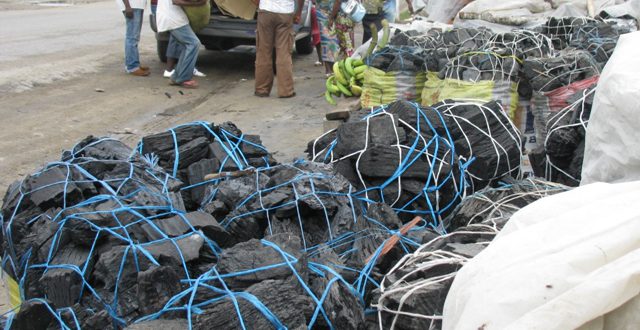 Cameroonian forest, which covers up to 40% of the national territory, remains the target of exploitative destruction by unemployed youth and women who engage in unsustainable charcoal production and sale.
Cameroonian forest, which covers up to 40% of the national territory, remains the target of exploitative destruction by unemployed youth and women who engage in unsustainable charcoal production and sale.
The victims of this destructive charcoal traffic are trees like Mangosi, Bush Mango, Small Leave, Bobinga and Makore due to their ‘strong and hard nature’.
At the Mungo Bridge Charcoal is sold in the open at the road site. This is where Dieudonne Fagueu, checks on his customer.
“Charcoal is produced in Mawo with wood from the Tiko forest area; in Bombe around the Southern Bakundu Forest and here in Mulango-Mungo. To produce charcoal, we go to the people around the forest like the traditional authorities and village notables for authorization. After this, we get to the forest and harvest the wood; split into smaller halves, dig a pit then put all the wood inside, carefully creating a hole in the middle as we pile the wood. After piling the wood, we cover it with grass. Then, we set fire to the wood through the hole and cover with soil and leave it to burn for three or four days depending on the kind and amount of wood. After which we come and remove as charcoal and fit into bags for marketing” Fagueu said.
Luther Ticha joined the charcoal business 5 years ago after high school. “I never had money to continue school and getting a job too was not easy. I resorted to charcoal production which is a little more lucrative; I can’t tell you the number of trees I cut per production but I produce between 5 to 15 bags per week depending on the season” Ticha disclosed
The charcoal business is even more lucrative to sellers. Celine Bojoh who dropped school has been engaged in the charcoal business for over two years. “The business is really profitable and has been helping to take care of myself and family. We buy them from Musaka, Douala Musango and many other places for 2500 to 3000 fcfa per back and in turn sell a bag for 3000 to 5000 fcfa. People come from Douala, Yaounde, Bamenda, Buea and other places to buy here….. Even whites come here to buy. Averagely, we sell between 8 to 10 bags daily with a daily profit of up to 5000 frs” she said
Vivian Yunwe is a single parent. She buys charcoal from Mawo in Limbe and Bombe in Kumba and sells at the Buea Central Market. She told this reporter that the charcoal business helps her to cater for her family and pay her children’s school fees.
These charcoal dealers said they are aware that they are operating in illegality and that the woods are sometimes harvested from government reserves. As a result, they often are confronted by forestry officials and may have to either bribe their way or have their charcoal seized.
“Forestry officials confiscated 47 bags sent to me from Bombe a few weeks ago but this was because the driver did not know what to do. If I were there, I would have given them something and there will understand”. Yunwe quipped
Ticha confirmed this allegation; “forestry officials often rush here threatening to seize our wood, engine saw and charcoal but you know everything in this country is about arrangement…..we simply arrange them and continue with our business”
Contrary to this, Celine Bojoh said some forestry officials w are duty conscious and will not compromise. “I can remember one white who came here and bought 150 bags of charcoal but unfortunately he met with forestry officials who seized everything demanding for a permit and his entire plea yielded no fruits” she recounted.
The charcoal dealers blamed their illegal action on long and complicated government procedure and cost of procuring a permit.
“There are many documents required for a permit which we don’t even know how to go about them and the cost I must tell you is expensive, over 150,000 frs? Where on earth can I find this kind of money?….we are not refusing but the government should consider some of us who are struggling. They should not send us away from the business but should reduce the requirements of obtaining a permit” they said.
Several visits to get a reaction from the service in charge of the transformation of forest products was abortive
By Bertrand Shancho Ndimuh







